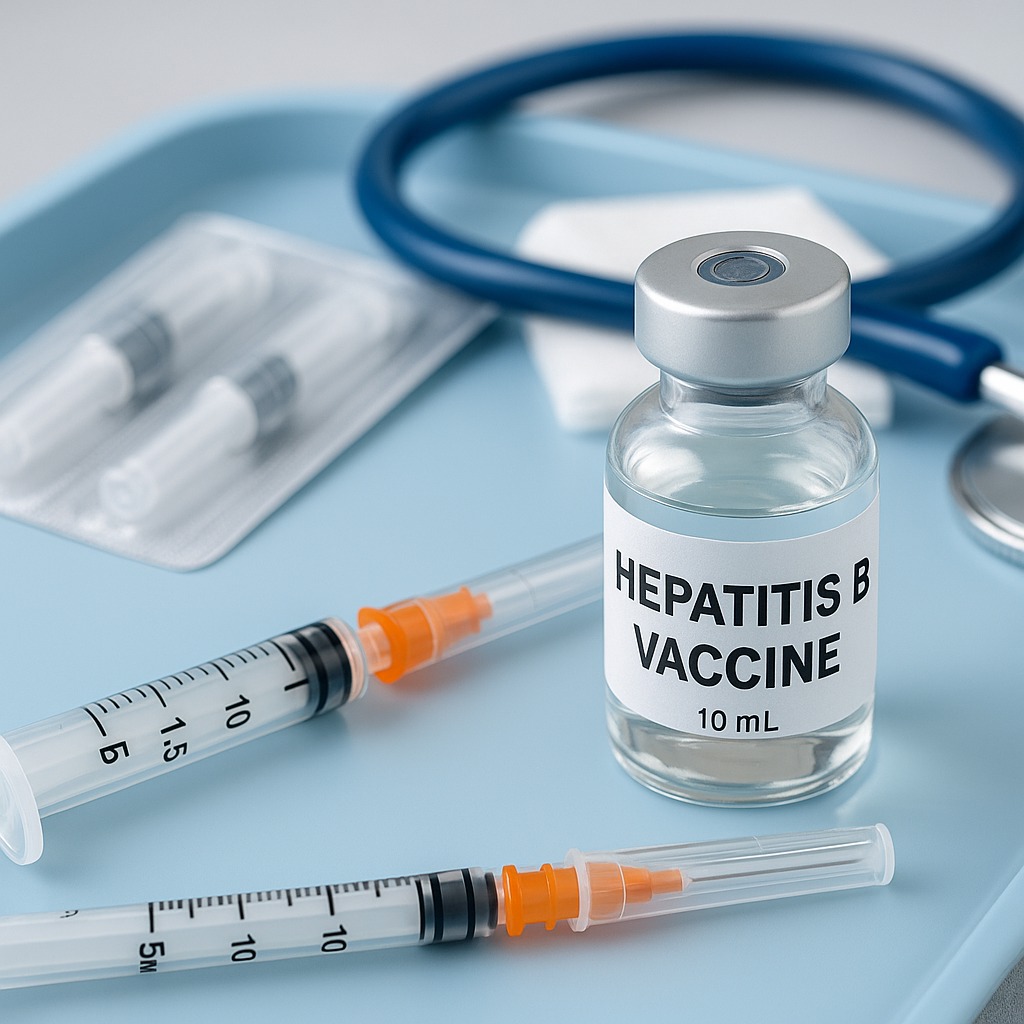The hepatitis B vaccine is a safe and effective way to protect yourself against hepatitis B virus (HBV), a serious infection that can cause chronic liver disease, cirrhosis, and liver cancer. Vaccination helps your body build long-lasting immunity, preventing infection before it starts. Doctors recommend this vaccine for infants, children, and adults who are at risk of exposure.
In this easy-to-read guide, you’ll learn what the hepatitis B vaccine is, how it works, when it’s recommended, possible side effects, precautions, and answers to the most common questions people search online.
Quick disclaimer: This article is for education only and not a substitute for professional medical advice. Always follow your healthcare provider’s instructions.
What Is the Hepatitis B Vaccine?
The hepatitis B vaccine contains non-infectious components of the virus that stimulate your immune system to make protective antibodies. It does not cause infection. Once vaccinated, your body can quickly fight off the virus if exposed.
There are several approved hepatitis B vaccines, including Engerix-B, Recombivax HB, Heplisav-B, and combination vaccines (such as Twinrix, which protects against both hepatitis A and B). The vaccines are given by injection, usually into the arm muscle.
How Does the Vaccine Work?
When you receive the vaccine, your immune system creates hepatitis B surface antibodies (anti-HBs). These antibodies provide protection if you come into contact with the virus. A successful vaccination series usually results in long-term immunity.
Who Should Get the Hepatitis B Vaccine?
The Centers for Disease Control and Prevention (CDC) and World Health Organization (WHO) recommend the vaccine for:
- All infants (starting at birth, as part of routine immunization)
- Children and adolescents who were not vaccinated earlier
- Adults at risk, including:
- Healthcare and laboratory workers
- People with chronic liver disease or diabetes
- Travelers to areas where HBV is common
- People with multiple sex partners or who inject drugs
- Household contacts of individuals with hepatitis B
Dosage and Schedule
The vaccination schedule depends on the type of vaccine:
- Standard series (Engerix-B, Recombivax HB): 3 doses at 0, 1, and 6 months.
- Heplisav-B (adults only): 2 doses, given 1 month apart.
- Infant schedule: Birth, 1–2 months, and 6–18 months.
A booster dose is not usually needed for healthy people who complete the full series.
Possible Side Effects
Most people tolerate the vaccine well. Common, mild side effects may include:
- Soreness, redness, or swelling at the injection site
- Low-grade fever
- Fatigue or headache
Serious allergic reactions are extremely rare. If you experience trouble breathing, hives, or swelling after vaccination, seek emergency care.
Precautions
- Tell your doctor if you had an allergic reaction to a previous dose or to yeast (some vaccines contain yeast protein).
- If you are moderately or severely ill, you may need to delay vaccination until recovery.
- Pregnant and breastfeeding women can safely receive the vaccine.
Popular FAQs
Q: How long does protection last?
Protection is long-term, often lasting decades. Most people do not need booster doses.
Q: Can I get hepatitis B from the vaccine?
No. The vaccine does not contain live virus and cannot cause infection.
Q: Is it safe for babies?
Yes. The vaccine is recommended at birth to protect infants early in life.
Q: What if I missed a dose?
You don’t need to restart the series. Just continue from where you left off.
Q: How effective is the vaccine?
More than 90% of healthy adults and children develop protective antibodies after completing the series.
Final Thoughts
The hepatitis B vaccine is one of the most important tools in preventing serious liver disease worldwide. Whether for newborns, children, or adults, it provides safe and effective long-term protection. If you haven’t been vaccinated, talk to your healthcare provider about starting the series today.
By staying protected, you not only safeguard your own health but also help reduce the spread of hepatitis B in your community.


Leave a Comment